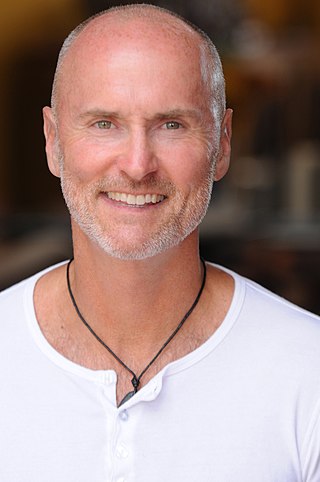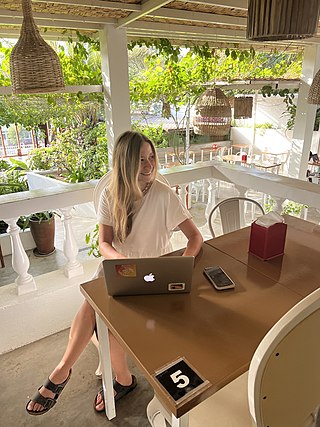
Hilton Worldwide Holdings Inc. is an American multinational hospitality company that manages and franchises a broad portfolio of hotels, resorts, and timeshare properties. Founded by Conrad Hilton in May 1919, the company is now led by Christopher J. Nassetta. Hilton is headquartered in Tysons, Virginia, United States.

Remote work is the practice of working at or from one's home or another space rather than from an office.

Starwood Hotels and Resorts Worldwide, Inc. was one of the largest companies that owned, operated, franchised and managed hotels, resorts, spas, residences, and vacation ownership properties. It was acquired by Marriott International in 2016. Starwood was founded in 1969 as a real estate investment trust. In 1995, it was acquired and reorganized by Barry Sternlicht, who was its chairman until 2005 and founder of the Starwood Capital Group. Starwood had 11 brands and owned, managed, or franchised 1,297 properties comprising 370,000 hotel rooms in approximately 100 countries.
Accor S.A. is a French multinational hospitality company that owns, manages and franchises hotels, resorts and vacation properties. It is the largest hospitality company in Europe, and the sixth largest hospitality company worldwide.
Sabre Corporation, a travel technology company headquartered in Southlake, Texas, is the largest global distribution systems (GDS) provider for air bookings. The company's primary product, the Sabre Global Distribution System, and others like it, act as neutral intermediaries, connecting travel suppliers like airlines and hotels with travel sellers like agencies. They offer real-time availability and pricing, making them important for corporate travel management.
Tripadvisor, Inc. is an American company that operates online travel agencies, comparison shopping websites, and mobile apps with user-generated content.

Kayak is a metasearch engine for travel services, including airline flights, hotels, rental cars, and vacation packages. It is owned and operated by Booking Holdings.

Coworking is an arrangement in which workers for different companies share an office space. It allows cost savings and convenience through the use of common infrastructures, such as equipment, utilities and receptionist and custodial services, and in some cases refreshments and parcel acceptance services. It is attractive to independent contractors, independent scientists, remote workers, digital nomads, and people who travel frequently. Additionally, coworking helps workers avoid the feeling of social isolation they may experience while remote working or traveling and eliminate distractions in home office. Most coworking spaces charge membership dues. Major companies that provide coworking space and serviced offices include WeWork, IWG plc, Industrious, and Impact Hub.
Vantage Hospitality Group Inc. was an American hotel corporation, operating hotels in the United States and internationally. Its brands include Best Value Inn and Lexington by Vantage. In 2016, Vantage Hospitality Group was acquired by Red Lion Hotels Corporation.

Chip Conley is an American hotelier, hospitality entrepreneur, author, and speaker.

Digital nomads are people who travel freely while working remotely using technology and the internet. Such people generally have minimal material possessions and work remotely in temporary housing, hotels, cafes, public libraries, co-working spaces, or recreational vehicles, using Wi-Fi, smartphones or mobile hotspots to access the Internet. The majority of digital nomads describe themselves as programmers, content creators, designers, or developers. Some digital nomads are perpetual travelers, while others only maintain the lifestyle for a short period of time. While some nomads travel through multiple countries, others remain in one area, and some may choose to travel while living in a vehicle, in a practice often known as van-dwelling. In 2023, there were 17.3 million American digital nomads, which was a 131% increase since 2019.
Trip.com Group Limited is a multinational travel agency holding company headquartered in Shanghai, China. The company maintains a customer service team based in Singapore. It is the largest online travel agency in China and one of the largest travel service providers in the world.
Philip C. Wolf was an American entrepreneur and executive known for his work in the travel, tourism and hospitality industry. The founder and former CEO of travel industry research firm PhoCusWright, Wolf served as board director and advisor to multiple travel and technology companies.
Booking Holdings Inc. is an American travel technology company incorporated under Delaware General Corporation Law and based in Norwalk, Connecticut, that owns and operates several travel fare aggregators and travel fare metasearch engines including namesake and flagship Booking.com, Priceline.com, Agoda, Kayak, Cheapflights, Rentalcars.com, Momondo, and OpenTable. It operates websites in about 40 languages and 200 countries.

Nomad Digital is an Internet Protocol (IP) Connectivity provider to the transport sector. It deploys wireless broadband connections for trains, metros, trams and buses, including passenger Wi-Fi services and remote condition monitoring for on-board rail components. Headquartered in Newcastle upon Tyne in England, it operates globally.
Cleartrip is a global online travel agency, headquartered in Mumbai.

ALICE is a hospitality technology company based in New York City. The company produces an eponymous operations platform that allows hotel guests to use an app on their smartphones to request services from hotel management. Guests can use both the ALICE app and SMS on their smartphones to request services such as restaurant reservations, taxi accommodations, room service, maintenance work, and other items and services.
Evita “Evie” Turquoise Robinson is a writer, motivational speaker, and is the founder of Nomadness Travel Tribe and Nomadness TV. She was born in Albany and raised in Poughkeepsie, New York. She has also lived in Paris, Japan, and Thailand. She is primarily known as a pioneer of the urban travel movement.
Gogobot was an online travel business headquartered in Palo Alto, California. The company was rebranded Trip.com in November 2016 and acquired by the Ctrip Group in 2017. Founded in 2010, by Travis Katz and Ori Zaltzman, by 2014 the company was the fifth most visited travel-planning site in the United States.

A Zoom town is a community that experiences a significant population increase as due to an influx of remote workers. The term became popular during the COVID-19 pandemic. The population growth of Zoom towns has had significant economic implications. The name is a play on "boomtown", a community that undergoes sudden and rapid growth, and Zoom, the videoconferencing software.










